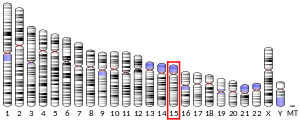From Wikipedia, the free encyclopedia
Protein-coding gene in the species Homo sapiens
Leucine carboxyl methyltransferase 2 is an enzyme that in humans is encoded by the LCMT2 gene .[ 5] [ 6] [ 7]
The protein encoded by this intronless gene belongs to the methyltransferase superfamily and acts as a G1 /S and G2 /M phase checkpoint regulator. It has been hypothesized that cigarette smoke-induced oxidative stress and transforming growth factor beta 1 may inhibit cellular proliferation by modulating the expression of this protein.[ 7]
^ a b c GRCh38: Ensembl release 89: ENSG00000168806 – Ensembl , May 2017^ a b c GRCm38: Ensembl release 89: ENSMUSG00000074890 – Ensembl , May 2017^ "Human PubMed Reference:" . National Center for Biotechnology Information, U.S. National Library of Medicine .^ "Mouse PubMed Reference:" . National Center for Biotechnology Information, U.S. National Library of Medicine .^ Nagase T, Ishikawa K, Miyajima N, Tanaka A, Kotani H, Nomura N, Ohara O (Aug 1998). "Prediction of the coding sequences of unidentified human genes. IX. The complete sequences of 100 new cDNA clones from brain which can code for large proteins in vitro" . DNA Res . 5 (1): 31–9. doi :10.1093/dnares/5.1.31 PMID 9628581 . ^ Noma A, Suzuki T (Dec 2006). "Ribonucleome analysis identified enzyme genes responsible for wybutosine synthesis". Nucleic Acids Symp Ser (Oxf) . 50 (50): 65–6. doi :10.1093/nass/nrl032 . PMID 17150819 . ^ a b "Entrez Gene: LCMT2 leucine carboxyl methyltransferase 2" .
De Baere I, Derua R, Janssens V, et al. (2000). "Purification of porcine brain protein phosphatase 2A leucine carboxyl methyltransferase and cloning of the human homologue". Biochemistry . 38 (50): 16539–47. doi :10.1021/bi991646a . PMID 10600115 . Strausberg RL, Feingold EA, Grouse LH, et al. (2003). "Generation and initial analysis of more than 15,000 full-length human and mouse cDNA sequences" . Proc. Natl. Acad. Sci. U.S.A . 99 (26): 16899–903. Bibcode :2002PNAS...9916899M . doi :10.1073/pnas.242603899 PMC 139241 PMID 12477932 . Marwick JA, Kirkham P, Gilmour PS, et al. (2003). "Cigarette smoke-induced oxidative stress and TGF-beta1 increase p21waf1/cip1 expression in alveolar epithelial cells". Ann. N. Y. Acad. Sci . 973 : 278–83. doi :10.1111/j.1749-6632.2002.tb04649.x . PMID 12485877 . S2CID 84732926 . Ng CC, Arakawa H, Fukuda S, et al. (2003). "p53RFP, a p53-inducible RING-finger protein, regulates the stability of p21WAF1" . Oncogene . 22 (28): 4449–58. doi :10.1038/sj.onc.1206586 PMID 12853982 . Gerhard DS, Wagner L, Feingold EA, et al. (2004). "The status, quality, and expansion of the NIH full-length cDNA project: the Mammalian Gene Collection (MGC)" . Genome Res . 14 (10B): 2121–7. doi :10.1101/gr.2596504 . PMC 528928 PMID 15489334 . Kawamata N, Inagaki N, Mizumura S, et al. (2005). "Methylation status analysis of cell cycle regulatory genes (p16INK4A, p15INK4B, p21Waf1/Cip1, p27Kip1 and p73) in natural killer cell disorders". Eur. J. Haematol . 74 (5): 424–9. doi :10.1111/j.1600-0609.2005.00417.x . PMID 15813917 . S2CID 46197026 . Noma A, Kirino Y, Ikeuchi Y, Suzuki T (2006). "Biosynthesis of wybutosine, a hyper-modified nucleoside in eukaryotic phenylalanine tRNA" . EMBO J . 25 (10): 2142–54. doi :10.1038/sj.emboj.7601105 . PMC 1462984 PMID 16642040 . Liu FY, Qi JP, Xu FL, Wu AP (2006). "Clinicopathological and immunohistochemical analysis of gastrointestinal stromal tumor" . World J. Gastroenterol . 12 (26): 4161–5. doi :10.3748/wjg.v12.i26.4161 PMC 4087364 PMID 16830365 . Moon SK, Choi YH, Kim CH, Choi WS (2006). "p38MAPK mediates benzyl isothiocyanate-induced p21WAF1 expression in vascular smooth muscle cells via the regulation of Sp1". Biochem. Biophys. Res. Commun . 350 (3): 662–8. doi :10.1016/j.bbrc.2006.09.092 . PMID 17026958 .





